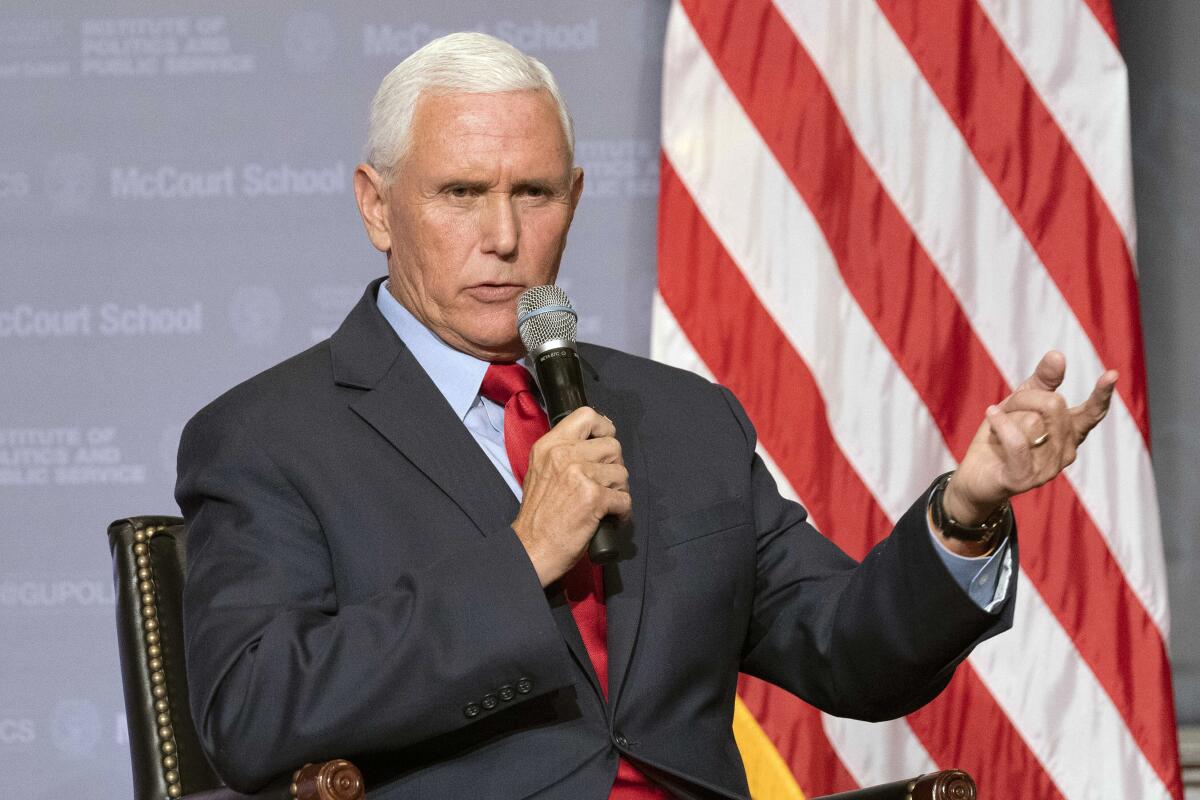A Word, Please: Your meaning can hinge on a comma, and that’s that

- Share via
“You know, I don’t think I have the authority to change the outcome.” That single line from former Vice President Mike Pence’s book “So Help Me God” contains what Pence reportedly told investigators is a serious punctuation error: the comma.
Pence was talking with Donald Trump on Christmas Day 2020 when he told the then-president either “You know, I don’t think I have the authority” or “You know I don’t think I have the authority.” According to ABC News, Pence told investigators looking into the Jan. 6 insurrection that what he really said was the no-comma version: that Trump knew that Pence didn’t believe he had the authority to change the outcome of the presidential election. But either Pence or one of his editors stuck a comma in there, changing the meaning of the sentence and offering a perfect example of just how important commas can be.
Commas have a number of jobs. They can separate coordinate nouns, like “We have a cat, a dog and a hamster.” They can separate coordinate adjectives, like “Our cat is cute, cuddly and playful.” They can separate whole clauses that are connected with a conjunction, like “Our cat is cute, but our dog is cuter.” They can set off a direct address, meaning when you call someone by a name, which is why “Let’s eat, Grandma” means something quite different from “Let’s eat Grandma.” They can separate nonrestrictive information, which means clauses that don’t influence the meaning of the noun: “The man, who was driving, was drunk” means there was just one man, but “The man who was driving was drunk” means you’re singling out the guy behind the wheel from some other guys.
In Pence’s book, the comma is doing yet another job: setting off an introductory clause. Here’s an example of how commas do this: “Because everyone is usually here on the first Tuesday of every month, we hold our meetings then.” The main clause of that sentence is “we hold our meetings then.” All the stuff that comes before it is just an introduction to the main clause, which is set off with a comma.
Punctuating introductory phrases and clauses isn’t an exact science. For some short introductory phrases, the comma is optional: “On Tuesday we have a meeting” and “On Tuesday, we have a meeting” are both acceptable.
June Casagrande gives a gift that bears repeating: advice on how to avoid common mistakes in holiday greetings and invitations.
But Pence’s sentence isn’t one of those the-comma-makes-no-difference situations. Instead, a comma changes the meaning. With a comma, the “you know” is an aside. The main clause, in that case, would be “I don’t think I have the authority.”
Without a comma, the main clause changes. It becomes “you know,” and the stuff that follows becomes an object of the main clause. The sentence then means: You know (that) I don’t have the authority.
It’s both interesting and, in this case, unfortunate that English lets you drop the word “that” in some cases. For Pence, a simple “that” in the sentence would have prevented any doubt that his point was that Trump knew Pence’s position.
There’s a term for this: the zero relative. And it’s very standard in English.
“I know you want more cake” means “I know that you want more cake.”
“Wanda got the job she wanted” means “Wanda got the job that she wanted.”
“The movie we saw was great” means “The movie that we saw was great.”
In every case, you have the option of dropping the relative pronoun, “that,” without losing any meaning. But do so with caution, because your sentence might be less clear without it.
The lesson here is to choose your words and your punctuation marks carefully. A comma can change your meaning entirely, and the relative pronoun “that” can help ensure that your reader understands what you mean.
June Casagrande is the author of “The Best Punctuation Book, Period.” She can be reached at JuneTCN@aol.com.
All the latest on Orange County from Orange County.
Get our free TimesOC newsletter.
You may occasionally receive promotional content from the Daily Pilot.






